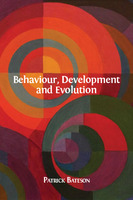Behaviour, Development and Evolution
| dc.contributor.author | Bateson, Patrick | |
| dc.date.accessioned | 2017-08-21 00:00:00 | |
| dc.date.accessioned | 2020-04-01T13:28:01Z | |
| dc.date.available | 2020-04-01T13:28:01Z | |
| dc.date.issued | 2017 | |
| dc.identifier | 633872 | |
| dc.identifier | OCN: 976022883 | en_US |
| dc.identifier.uri | http://library.oapen.org/handle/20.500.12657/31227 | |
| dc.description.abstract | "The role of parents in shaping the characters of their children, the causes of violence and crime, and the roots of personal unhappiness are central to humanity. Like so many fundamental questions about human existence, these issues all relate to behavioural development. In this lucid and accessible book, eminent biologist Professor Sir Patrick Bateson suggests that the nature/nurture dichotomy we often use to think about questions of development in both humans and animals is misleading. Instead, he argues that we should pay attention to whole systems, rather than to simple causes, when trying to understand the complexity of development. In his wide-ranging approach Bateson discusses why so much behaviour appears to be well- designed. He explores issues such as ‘imprinting’ and its importance to the attachment of offspring to their parents; the mutual benefits that characterise communication between parent and offspring; the importance of play in learning how to choose and control the optimal conditions in which to thrive; and the vital function of adaptability in the interplay between development and evolution. Bateson disputes the idea that a simple link can be found between genetics and behaviour. What an individual human or animal does in its life depends on the reciprocal character of its transactions with the world about it. This knowledge also points to ways in which an animal's own behaviour can provide the variation that influences the subsequent course of evolution. This has relevance not only for our scientific approaches to the systems of development and evolution, but also on how humans change institutional rules that have become dysfunctional, or design public health measures when mismatches occur between themselves and their environments. It affects how we think about ourselves and our own capacity for change." | |
| dc.language | English | |
| dc.subject.classification | thema EDItEUR::P Mathematics and Science::PS Biology, life sciences::PSV Zoology and animal sciences | en_US |
| dc.subject.other | imprinting | |
| dc.subject.other | zoology | |
| dc.subject.other | behavioural development | |
| dc.subject.other | biology | |
| dc.subject.other | adaptability | |
| dc.subject.other | evolution | |
| dc.subject.other | genetics | |
| dc.subject.other | Inbreeding | |
| dc.subject.other | Organism | |
| dc.title | Behaviour, Development and Evolution | |
| dc.type | book | |
| oapen.identifier.doi | 10.11647/OBP.0097 | |
| oapen.relation.isPublishedBy | 23117811-c361-47b4-8b76-2c9b160c9a8b | |
| oapen.relation.isbn | 9781783742486 | |
| oapen.collection | ScholarLed | |
| oapen.pages | 134 | |
| oapen.remark.public | Relevant Wikipedia pages: Evolution - https://en.wikipedia.org/wiki/Evolution; Evolutionary developmental biology - https://en.wikipedia.org/wiki/Evolutionary_developmental_biology; Gene - https://en.wikipedia.org/wiki/Gene; Inbreeding - https://en.wikipedia.org/wiki/Inbreeding; Organism - https://en.wikipedia.org/wiki/Organism | |
| oapen.identifier.ocn | 976022883 |

